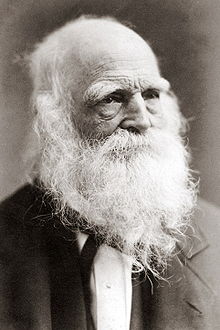William Cullen Bryant (November 3, 1794 – June 12, 1878) was an American romantic poet, journalist, and long-time editor of the New York Evening Post. Bryant developed an interest in poetry early in life. Under his father's tutelage, he emulated Alexander Pope and other Neo-Classic British poets. "The Embargo", a savage attack on President Thomas Jefferson published in 1808, reflected Dr. Bryant's Federalist political views. "Thanatopsis" is Bryant's most famous poem, which Bryant may have been working on as early as 1811.
In his last decade, Bryant shifted from writing his own poetry to a blank verse translation of Homer's works. He assiduously worked on the Iliad and The Odyssey from 1871 to 1874. He is also remembered as one of the principal authorities on homeopathy and as a hymnist for the Unitarian Church. Poet and literary critic Thomas Holley Chivers said that the "only thing [Bryant] ever wrote that may be called Poetry is 'Thanatopsis', which he stole line for line from the Spanish. The fact is, that he never did anything but steal — as nothing he ever wrote is original." Contemporary critic Edgar Allan Poe, on the other hand, praised Bryant and specifically the poem "June" in his essay "The Poetic Principle."
In celebration of the month, we present the poem March, by poet William Cullen Bryant.
March
By William Cullen Bryant
The stormy March is come at last,
With wind, and cloud, and changing skies,
I hear the rushing of the blast,
That through the snowy valley flies.
Ah, passing few are they who speak,
Wild stormy month! in praise of thee;
Yet, though thy winds are loud and bleak,
Thou art a welcome month to me.
For thou, to northern lands, again
The glad and glorious sun dost bring,
And thou hast joined the gentle train
And wear'st the gentle name of Spring.
And, in thy reign of blast and storm,
Smiles many a long, bright, sunny day,
When the changed winds are soft and warm,
And heaven puts on the blue of May.
Then sing aloud the gushing rills
And the full springs, from frost set free,
That, brightly leaping down the hills,
Are just set out to meet the sea.
The year's departing beauty hides
Of wintry storms the sullen threat;
But in thy sternest frown abides
A look of kindly promise yet.
Thou bring'st the hope of those calm skies,
And that soft time of sunny showers,
When the wide bloom, on earth that lies,
Seems of a brighter world than ours.
*This poem is in public domain.
As a writer, Bryant was an early advocate of American literary nationalism, and his own poetry focusing on nature as a metaphor for truth established a central pattern in the American literary tradition. Martin Luther King, Jr quoted Bryant in his speech "Give Us the Ballot", when he said, "there is something in this universe which justifies William Cullen Bryant in saying: 'Truth crushed to earth will rise again.'"

Comments
Post a Comment